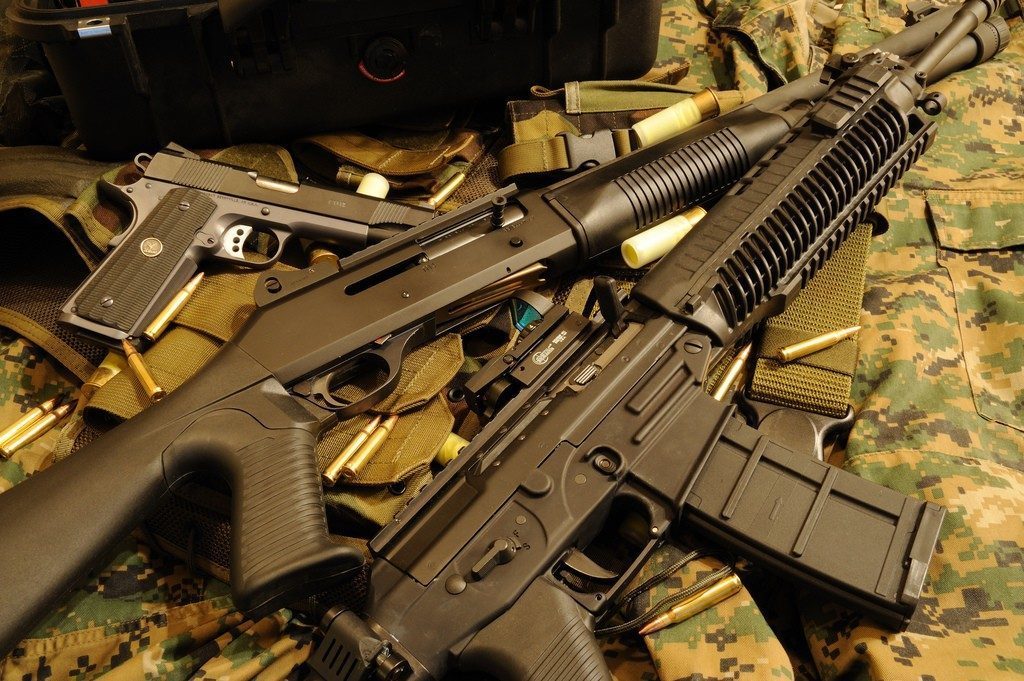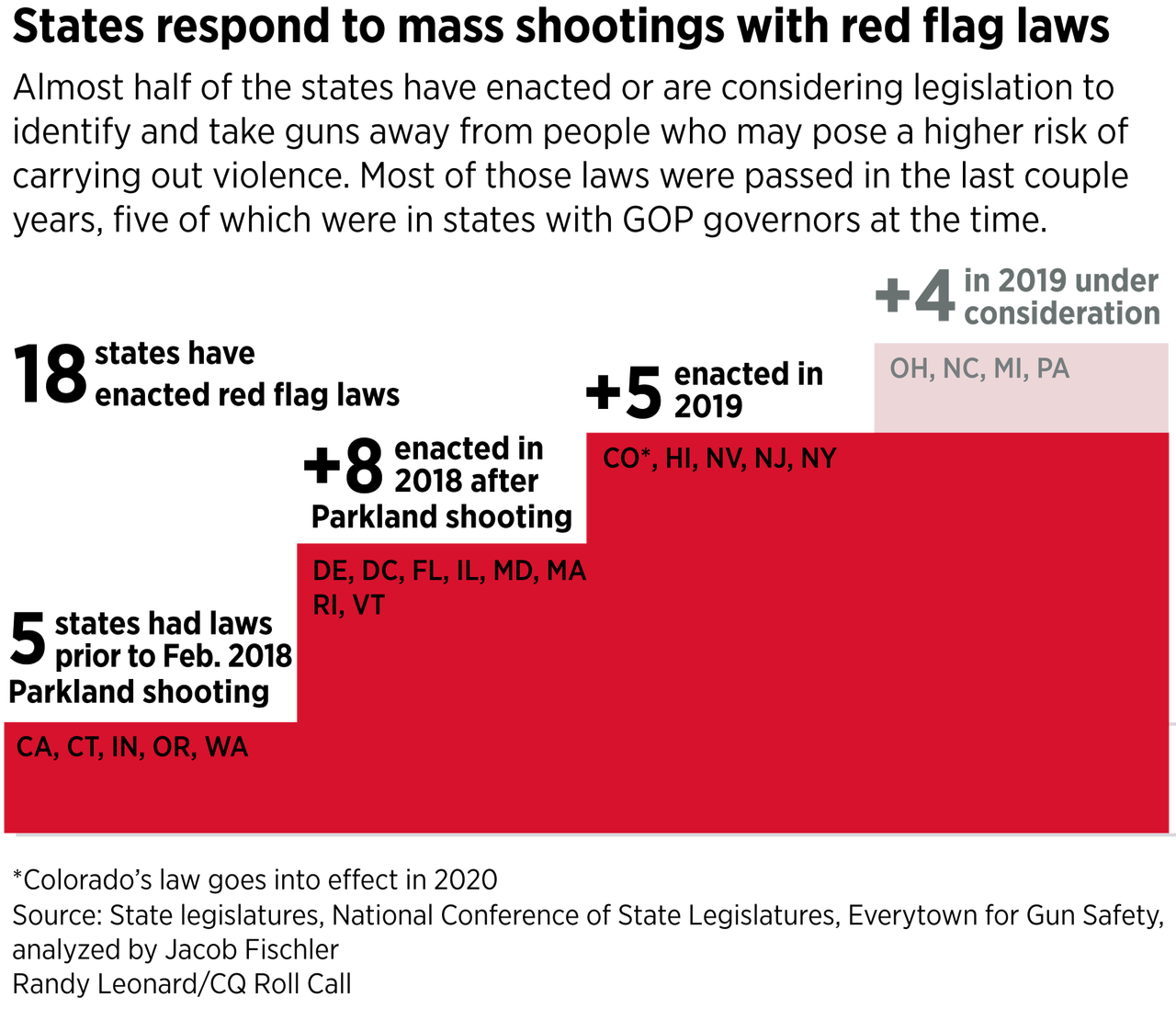 By Tyler Durden
By Tyler Durden
A growing number of states are now allowing family members and law enforcement officials to confiscate an individual’s guns via so-called red flag laws in the wake of several recent mass shootings, according to Roll Call‘s Jacob Fischler.
In Ohio, for example, Republican governor Mike DeWine has been hard at work pushing such gun control proposals following an August 4th mass shooting in Dayton which left 10 people dead and 27 injured.
DeWine’s 17-point proposal — of which the red flag and background check plans are only two — includes increasing penalties for gun violations, increased funding for behavioral health services and school safety programs, all measures that could win over conservatives.
DeWine has involved gun advocates, whom he calls “our Second Amendment friends,” in the process. There’s little indication many will back the package. –Roll Call
“No one said this is going to be particularly easy,” said DeWine in an interview with Fischler, who notes that DeWine’s predecessor, John Kasich, was unable to accomplish given a state legislature in which the GOP holds a supermajority in both chambers.
“How do you protect the Second Amendment, but at the same time protect the public?” he added.
Since the February 14, 2018 mass shooting at the Marjory Stoneman High School in Parkland, Florida, the number of states with red flag laws has grown from five to twelve, plus the District of Columbia. Overall, 18 states now have them.
In other states, similar efforts have been thwarted by pro-gun interests.
“It’s certainly encouraging that Gov. DeWine has endorsed policies, that there [are Republicans] signed on to co-sponsor the background checks law,” said William Rosen, managing director of state policy and government affairs at Everytown for Gun Safety, the advocacy group founded by former New York City Mayor Michael Bloomberg. “These are still going to be big fights.”
According to Rosen, the current background check system has been effective – stopping over 3 million sales; however, he believes it could be improved.
Gun rights activists consider red flag proposals, a version of which is the centerpiece to DeWine’s 17-point plan, problematic for several reasons, including the potential for misuse. A disgruntled family member could report a non-threatening gun owner in an effort to harass, they say, and they argue the policies lack due process provisions to ensure rights are protected. –Roll Call
“Our organization 100 percent opposes red flag laws because of the due process problem,” said Buckeye Firearms Association executive director Dean Rieck – whose group gave DeWine an “A” rating on gun rights in 2018.
Other proposals, such as expanding background checks, have also been thwarted by pro-gun groups who argue that they impede one’s Second Amendment rights without improving safety in a meaningful way due to the fact that many gun crimes are committed by people who should have had guns anyway. The gunman in a West Texas rampage that left seven dead last month failed was able to obtain his AR-style rifle through a private sale after having failed a background check due to a “mental health issue.”
Most Americans are in favor of enhanced gun control policies according to an APM Research Lab / Guns & America / Call To Mind poll cited by Roll Call, which found that 70% of respondents favored red flag laws which would allow police to initiate a removal order. When family members are added to those who can make that determination, the percentage of those in favor rose.
The 2018 Parkland shooting, where a gunman with a history of displaying warning signs killed 14 high schoolers and three staff members, was something of a turning point for red flag laws. Then-Gov. Rick Scott and his fellow Republican leaders enacted such a law afterward.
“Sometimes it takes a tragedy … to loosen the gun lobby’s grip,” Rosen said.
In addition to Scott, Republican governors signed four of the 11 other red flag laws that have passed since Parkland, a fact gun control advocates promote to show their cause is bipartisan.
But other than Florida, those cases all involved traditionally blue states — Illinois, Maryland, Massachusetts and Vermont — where Democrats controlled the legislatures and moderate GOP governors were running for reelection. –Roll Call
That said, there has been pushback from some on the right. New Hampshire Republican Governor Chris Sununu, for example, has vetoed bills which would expand background checks and introduce a red flag law, while Wisconsin and North Carolina lawmakers have outright ignored or rejected calls from their Democratic constituents to take up similar measures.
“I certainly don’t see a tidal wave of change,” said Peggy Lehner, a Republican state senator from Dayton, Ohio, who supports red flag laws and expanded background checks.
Meanwhile, Texas Governor Greg Abbott has been walking a tightrope in a very pro-gun state in the wake of last month’s racially motivated shooting that claimed 22 lives in El Paso.
Abbott, a Republican, comfortably won election in 2014 and reelection last year running as a friend to pro-gun interests.
At the National Rifle Association’s Institute of Legislative Affairs leadership forum in 2018, Abbott told the group that “the answer to gun violence … is to strengthen Second Amendment rights for law-abiding citizens.”
But he followed that with a line that guns should be taken “out of the hands of those mentally unfit to have” them. More recently, he listed improving enforcement of existing laws on background checks and emergency protective orders that take guns away from people convicted of domestic assault. –Roll Call
Abbott has formed a roundtable comprising elected Republicans and Democrats, along with police and advocates on both sides of the debate. The group’s initial meeting ran for four hours over its scheduled two, which resulted in “several strategies that were put on the table that we will continue to talk about,” according to Abbott.
That said, not everyone is happy with the results.
“You wouldn’t call it action-oriented,” said Ed Scruggs, chairman of the board of Texas Gun Sense, a group that pushes for stronger gun regulations. “I wouldn’t say it was a politically bold step. But it was a step to take, and I would say the talks were serious.”
DeWine, on the other hand, believes that red flag laws are the way to go since they would require a court hearing and a court order before a gun can be seized. Twelve days later, prosecutors would be required to show “clear and convincing” evidence that the gun owner poses a threat in order to keep their guns from them.
Dean Rick, of the Buckeye Firearms Association disagrees. “The problem with the way all red flag laws to date have been structured is property is seized first and then the legal process happens afterward,” he said, adding “This is the sort of thing that can be abused.”
Also See:
HARPA: Trump Seeking New Agency to Use A.I. to Screen Mental Health for Gun Ownership?
“Red Flag” Laws Should Be a Red Flag
This article was sourced from ZeroHedge.com
Subscribe to Activist Post for truth, peace, and freedom news. Follow us on Minds, Twitter, Steemit, and SoMee. Become an Activist Post Patron for as little as $1 per month.
Provide, Protect and Profit from what’s coming! Get a free issue of Counter Markets today.



Be the first to comment on "Growing Number Of States Adopting “Red Flag” Gun Seizure Laws In Wake Of Mass Shootings"